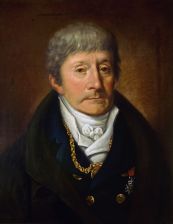They say he poisoned
Amadeus Mozart; but
That is not the truth.
And then they called him
A second-rate composer;
If he was so bad,
Why then did Schubert,
Liszt, Beethoven, and Czerny
Call him their teacher?
He’s been much maligned,
Old Antonio Salieri.
Here’s the real story.
If you ask people who Antonio Salieri was, the two most likely answers might be
“Who?”
or
“Isn’t he the guy who poisoned Mozart?”
Since I’ve been pointing you in the direction of a series of free Mozart concerts in the last few weeks (more to come—stay tuned!), I thought it only fair that I clear up some of the misunderstandings about Salieri.
First, Salieri didn’t poison Mozart. Though the two had their differences, they respected each other. Salieri produced a revival of Mozart’s Figaro in Vienna (when he had the opportunity to produce an opera of his own), and Mozart himself wrote of Salieri’s enthusiastic reactions during a performance of Mozart’s The Magic Flute that the two attended together.1 A collaboration between Salieri and Mozart, once considered lost, was found in 2016. After Mozart’s death, Salieri taught his son, Franz Xaver Mozart.
Salieri’s students included the composers mentioned above, and more.2 Students were keen to learn about vocal writing from him, as Salieri was a highly-regarded figure and a very successful opera composer. But Salieri didn’t always get it right: fortunately, Schubert ignored Salieri’s disdain for the German Lied,3 and went on to write over 600 of them. Salieri taught most of his students for free, remembering how one of his mentors had once taught him for free. I think it’s fun to note that, “from time to time Salieri treated his pupils, Schubert among them, to ice cream, which was obtainable from a lemonade kiosk….”4 Picture Salieri, Schubert, and other students standing on a Vienna street corner eating ice cream!
As for the second-rate composer jibe … well, when you’re constantly being compared to Mozart, that’s a no-win situation, isn’t it? The criticism is typically leveled at his non-operatic works. You can judge for yourself: more of his secular and religious orchestral and chamber works may be found here. Here is Salieri’s lively Sinfonia Veneziana.
When it came to opera, however, Salieri was an innovator. He would mix aspects of serious and comic opera, use established singing styles in unexpected ways, and he even incorporated ballet. Many of his operas were very successful, in particular, Armida and Les Danaïdes. You can see the entire opera Les Danaïdes at this link. Some of his other operas, including Tarare, Axur, re d’Ormus, L’Europa Riconosciuta, and La grotto di Trofonio are also available online.
Here is the overture to Les Danaïdes.
If you find yourself becoming a Salieri fan, you might want to check out some of these recent recordings.
Salieri—he’s making a comeback.
References
- https://en.wikipedia.org/wiki/Antonio_Salieri
- https://en.wikipedia.org/wiki/List_of_music_students_by_teacher:_R_to_S#Antonio_Salieri
- Gibbs, Christopher H., “Writing Under the Influence?: Salieri and Schubert’s Early Opinion of Beethoven” Current Musicology No 75, Spring 2003, p 125 (quoting Deutsch, Otto Erich, Schubert: Memoirs by his Friends, trans. Rosamond Ley and John Nowell. London: A &C Block, 1958 pp 20 and 130). https://core.ac.uk/download/pdf/27300266.pdf
- Reference 3, quoting Deutsch, p 66.
_____
Image attribution: Portrait of Antonio Salieri by Joseph Willibrord Mähler [Public domain], via Wikimedia Commons, https://commons.wikimedia.org/wiki/File%3AAntonio_Salieri_painted_by_Joseph_Willibrord_M%C3%A4hler.jpg.


February 1, 2017 at 9:41 pm
Nice! A very competent composer, good teacher, nice guy. I blame Shaffer very much for popularizing really distorted views of both Mozart and Salieri (as well as the Emperor and Konstanze). Well, that all comes from Pushkin and Rimsky, building on a bunch of totally untrue rumors started way back, who knows when or by whom. Thanks for a good start at rehabilitation! Still, the Mozart – Salieri pairing makes a very good study of the demonstrable differences between a very competent and an inspired composer working in the same general style context. Very instructive to consider the music of such competent and musical composers as von Dittersdorf, Hummel, Salieri, etc., in the light of the few truly great composers of their time. I have always felt you can’t have the very few truly great artists in any field (math, science, painting, music, poetry and so on) without hundreds of lesser but competent figures building up the style and technique before and during their time. It’s like a pyramid, or so I believe.
Tom
LikeLike